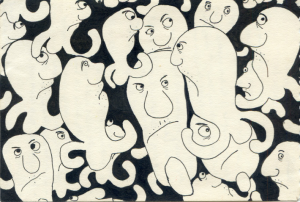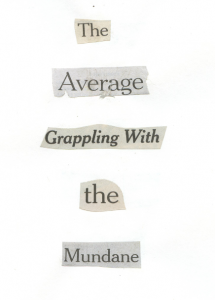
The fire was a distant stimulus. A more urgent one was before her, on her laptop—her Facebook page. While she enjoyed perusing the updates from her 3,004 friends to discern salient facts about them, scrolling endlessly through their comments and photos for more clues about their likes, habits and tendencies, she inevitably returned to linger over her own page. She was far more interesting and had far more likable habits than anyone else that she knew. But today something was amiss. She looked beneath her update, staring at the tiny blue and white thumbs up icon that signified that someone liked her post. And there was nothing there.
At first she thought there was a glitch in the system, that the whole network had gone on the fritz, been hacked or something, but when she opened her newsfeed and checked the updates posted by her friends, she saw an avalanche of likes appearing in a constant stream. Likes centered around tart political zingers, links to cultural events, inspirational memes, acronymic airport codes indicating flight itineraries, trenchant observations about loofah gloves, blinding allegiances to various sports teams, adorably cute pet photos, lunch time oysters and other food porn pics, faux happy marriage and family photos, obese commuters eating cheese popcorn photos, the when-I-had-hair photos from middle-aged men, the when-I-was-skinny photos from middle-aged women, and of course the inevitable tribute to a friend who had succumbed to suicide and was now, forever more, interred in the digital necropolis. Each and every update from her network of friends had several, if not dozens of likes. She looked back at her post, then glanced at the clock. Five minutes had passed, and there was still not one single like.
Her post was certainly likeable. All of her posts were likeable. She loved posting and she loved being liked. She was not sure that she was that well liked in life; she certainly wanted to be liked, and usually felt liked, but she was never 100% certain. On Facebook, though, she was always sure that she was liked. The thumbs up icon and the number of people who had clicked it were definitive, hard boiled, quantifiable proof of it. That was why she was here. To like and to be liked. That was the only reason to be here.
And now this. No likes at all. She looked at her post, wondering what she’d done wrong. For the fourth or fifth time, she read her words:
Even at age five, I had an
uncanny sense of style.
It wasn’t so much the wisdom or cleverness of her words that she thought people would like, it was the overall effect, the careful crafting of her image, the wry contrast between her words and the historical picture accompanying it, which was of a small, tow-headed schoolgirl wearing ill-fitting, high-waisted pants, a too-tight blouse, and a smirking, self-assured, vainglorious expression that conveyed overflowing confidence and, even at the age of seven, an obliviousness to all things but herself. It was another “Throwback Thursday” picture, a proven like-generator of hers for years now. These nostalgic posts usually involved juxtaposing her current virtues or desired virtues against retro imagery of her, to make a not so subtle communiqué about how she wanted to be perceived in the present. The gentle use of irony, she thought, saved her from sounding egotistical.
Or did it? Again, she remembered how many times the formula had worked. How many times she’d used self-deprecation to trumpet her superiority, in yet another “humble brag.” Of course, she knew that for every like she courted and received from others, she would have to return the favor, and that each like of hers was strategically placed for maximum effect, to align herself with everyone and sympathize with every one of their daily sagas—their dreams, their fears, their innermost feelings and most unusual idiosyncrasies. She knew that by accepting this reciprocal agreement of liking and being liked back, that she was dooming herself to liking everything unconditionally, automatically, but as long as she received just as many likes back, or, hopefully, a whole lot more, it was worth it.
Whether it was a child graduating from middle school or a horribly burned frittata or an oh-so-mischievous kitty lurking in the laundry basket, she kept liking and liking and liking without ever tiring of liking, as she cheered on the antics, causes and beliefs of her extremely likeable, equally like-obsessed friends. Because the more she liked them, the more they would like her.
This was her surface game, anyway. The feigned concern, interest and admiration of others. However, even these likes were only a prelude to another tactic of hers, a point of intersection where she would insert herself into someone else’s conversational thread and lamprey the attention away from the subject at hand to reflect it back at herself. It took a careful sleight of hand to affect this dynamic, and she often wondered if her more prescient friends noticed how she always coopted the topic and steered it back her way, but, thankfully, no one ever made the observation. She also knew that even if anyone did make the realization, it was far too inane and subtle to mention publically, let alone on-line. So it was a moot point.
To her, Facebook was her daily talk show, starring her favorite person, her. And boy, did this favorite person have a lot to say. From the minute she awoke, in the car, on the train, over lunch, at her desk, in meetings, in elevators, in the kitchen, in line, on walks, on the toilet, her every brain wave, silly observation, innate fear, or wayward thought, no matter how shameful, indulgent or inane, was voiced. Spoken aloud, they would have doomed her to being shunned. But presented on line, the effect was mitigated, for it was her persona rather than her person that was to blame, because the on-line her and the real her were very different. In fact, it hardly seemed like there was a real her anymore. The only her was the on-line her now. Within its world there was safety, security; in its sea of likes it was easy, because there were only two options, liking and being liked, and when you enjoyed both, well, it was a very likable situation, this Facebook.
Except right now. There was no like right now. Because after fifteen minutes of staring at her laptop, not a single person had liked her post. She felt a flush of white-hot anger soar up to her temples and before she knew it she was slamming the laptop shut without even logging off properly.
Outside the train window, the river gleamed in the morning sun. But it didn’t exist at all. Not for her. She sat there, riveted to her phone, opening up Facebook, ready to see the reaction to the post she had made right before bed. It wasn’t anything too risqué, but it was a bit more provocative than usual. After the zero likes of yesterday, she couldn’t take any chances.
As the page loaded and she looked at the small globe notification icon that registered how much activity and interaction she was getting from her 3,004 friends, she was surprised to see that there wasn’t a single number beside it. In a mild daze, she clicked on her image, and went to her profile. Everything was in order; the pic of her when she was thirty pounds lighter was still smiling out at the world, as was the timeline imagery of the Louvre and its stunning, glass pyramid entranceway, which was her favorite part of the entire museum. She quickly scrolled down to her latest update, and once again, could not believe what she saw.
Despite the fact that she posted it at 10 p.m. last night, and it was now almost 8:30 a.m. the next morning, there had not been a single like.
She quickly reviewed the unglamorous shot of her and her stubbly husband swaddled in their rumpled sheets and reread her post:
After hopping into bed and thinking about sex,
the old married couple quickly fell asleep.
Not a hilarious post, but an attention-getting one, she thought. The bedrock of her marriage provided an endless vein of material that she often mined for engaging content. And their sex life, or lack thereof, was her number one topic. As was the bumbling, well-meaning, sitcom-like image of her husband and the tough, savvy, still havin’ sex or tryin’ to image of herself that she projected. Each day, several times a day, the two of them became a digital Ozzie and Harriett, beaming forth snippets of their uniquely fascinating romance out to their thousands of friends: the office friends, childhood friends, neighborhood friends, best friends, casual friends, the friends of friends, every one of the legions of acquaintances, ex-coworkers and semi-strangers that they’d managed to ensnare in their vast, ever-expanding web of likes got to see the two of them front and center, entertaining them all.
Many of these posts drove home the thought that she was still sexy and desirable. It was easy to be sexy and desirable on Facebook. On Facebook, she could select the images of herself she wanted everyone to see and control everything. The only problem was when someone would “tag” her, which never failed to result in an unflattering image of her being offered to the masses. To combat those random, hopelessly quotidian images that others put forth, she posted updates defining her as fetching and coquettish, even referring to herself as a “cougar” once, although she knew she could never live up to the salaciousness of the term, or the sleek, feline insouciance it implied.
Her occasional, but well-placed references to sex, as well as her noble efforts to still practice it with her languid, always-tired husband of eight years were a constant wellspring. They also served to hide the painful reality that she was well past the petite years, graying, wrinkling, sporting lunch lady arms and wearing a saddle of cellulite around her wine-swollen haunches. This was why she confined her lascivious posts to close-ups of candy apple red Christian Louboutin pumps, or detail shots of her Maybelline-stained eyelids and floridly painted lips. Two-piece swimsuits were unthinkable, but tastefully composed macro shots with the right cropping could at least hint at how MILF-ish and desirable she still was, couldn’t they?
These frequent posts about their sex life always garnered lots of responses, as navigating the shoals of marriage and couplehood were easy triggers to react to. Only this time, every single one of them had chosen NOT to react. Why? Was she suddenly repulsive? Did everyone, overnight, decide to dislike her? Had she done something to mass-annoy three thousand people? What was making everyone, all of her 3,004 friends, ignore her?
She ground her teeth as the train bounced over the tracks. It was time to get serious. It was time for a monumental outpouring, a tidal wave of likes now.
In a wash of red carpet, flowing velvet curtains, and the glow of candlelight, Le Bistro presented its Yelp-approved splendors to her. But it might as well have been Port Authority bus terminal, for her iPhone was a far more captivating stimulus. She stared into it, and the pale glow of Steve Jobs’ gift to mankind bathed her in a soft, bluish tint, rendering her face a curious, moon-like orb in the shadows. She looked at her post and felt a shudder. She took a double sip of her Bordeaux, swallowed too quickly and examined the tiny screen and the image that took up most of it.
And what an image it was—the kitten was impossible to ignore. And, more importantly, the kitten did not have a single hair. Her reasoning was simple: anything with cats was a guaranteed like; after all wasn’t half the internet cat videos and cat pics? It was a smart move. But to that little bit extra, to go hairless, well, she still couldn’t believe she’d done it. After deciding on a cat, she found herself asking the pockmarked salesman at Pet Central to let her hold the strange, unnervingly smooth, scalded-looking beast that had been cowering in the cage beside the calicos. With its soft, gerbil eyes and obtrusive ears, the hairless little whelp, which trembled at her touch, looked so forlorn and hideous that she immediately knew it would garner sympathy from all. So she purchased it on the spot, took it home, got her phone out and snapped a few dozen shots of it looking cute—or as cute as the homely little mutant could ever look—and then she put the shots on Facebook. Once she’d posted all four pics and penned her update, all thoughts of the hairless creature left her head, as she had already banished it to the furnace room and was planning on returning it to Pet Central the next day. And now, here it was, the next day, and after eight hours of frantically checking Facebook every twenty minutes, her conclusion, once again, was the same.
Not one thumb.
Should she have written something else? Maybe saying “Meet Yoda, the newest member of the family,” wasn’t interesting or provocative enough. Maybe the lameness of that post deflated the power of the beast’s ungodly appearance. But she didn’t think she needed to be that clever, the cat looked preposterous, that should’ve been enough to attract people and get them liking. That and the “Star Wars” reference. Didn’t everyone like Star Wars? And Yoda? But she had been wrong about that. Dead wrong.
She took a too-big swig of wine. After setting the empty glass back on the table so gingerly that it didn’t make a sound, she sat there silently for a moment, until her mouth opened slightly in a rictus of shock, and her sad and vanquished eyes drifted away from her phone to gaze off into space.
Over the next few weeks, there were many things that she could have noticed or appreciated. The sound of the wind caressing the chimes in the screen house. The swaying of the crimson leaves before they broke free from their autumnal stems and spindled down to carpet the earth. The vermillion sunsets over the reservoir. But none of them held any appeal. Reality was nothing more than a bland tableau. She had no use for it. Not with her screens.
From iPhone to iPad to iMac, she monitored them constantly, checking her Facebook page over and over, every few minutes, until she finally decided to stay logged in 24 hours a day. Her phone never left her clutches; she brought it to meetings, meals, work sessions; she cradled it in bed, fondled it in cabs, gazed longingly at it on the sidewalk, peered at on trains, everywhere she went, its 4.7 inch LED-backlit widescreen led the way, until it became a de facto appendage. Eventually, her neck became stiff from constantly craning down to look at it every few seconds, and it wasn’t long before she was walking, or creeping along rather, with a stooped, almost anteater-like posture. But she ignored the pain, for the mental anguish was far greater.
It was the most insane thing ever. She could barely fathom it. The very terrain of her existence, its contours and shapes, had been scraped away. Because once again, there were no likes. Zero. Not a single one.
She’d upped her game. She really had. Each successive post had been more and more likeable, on the Like-O-Meter, she was red lining, peaked, running at full tilt. Some of her posts were so wise and heartfelt and passionate and caring that they would’ve made Deepak Chopra, Tony Robbins or any other inspirational speaker vomit, while other posts were so scathingly funny, so piercingly insightful, and so painfully true that they might have humbled George Carlin. She dug deep, exploring every possible emotion, making posts that were sad, posts that were happy, posts that were goofy, posts that were smart, posts that were sobering, posts that were zany, posts that reflected the harrowing news stories of her sad and murderous times, posts supporting causes she’d never cared about; she made posts of every flavor, every nuance, and still, amazingly, infuriatingly, heartbreakingly, there had been not one single response.
She crouched at the kitchen table, whose orderly place settings were now obscured with crusty wine glasses, empty bottles, overflowing ashtrays—sadly, she’d recently started puffing away again after eight years of being nicotine free—and the innumerable crumbs, festering dollops and other food remnants that lay beneath and atop it all. It was the third day in a row she had called in sick, and for the third day in a row, she had spent it before her computer, but no matter how many desperate thoughts she arrived at, the fact remained same: her entire network of so called “friends,” all 3,004 of them, had spurned her.
She scrolled through her series of posts, eyeing each image, each link, video and article, rereading each line she wrote, pondering each topic she’d chosen, wracking her brain as to why none of her updates, not a single one, had resulted in a like:
Lunch break! Time to samba!
Change is inevitable, except from a vending machine.
Thoughts and prayers for the victims in the Fort Wayne Bed, Bath and Beyond steak knife massacre.
Every sunrise brings hope. Every sunset brings peace.
This is Tad, our neighbor. Tad has Down Syndrome, but he never lets it get him down. Especially with this miniature trampoline I purchased for him yesterday! #smilesgalore, #bouncyboy #DownWDownSyndrome.
I miss my Mom.
Heaven just got a whole lot sluttier. R.I.P. Madonna.
Thousands of Malawian children suffer from malnutrition. That’s why I’ve just booked a ticket to Lilongwe. I will be leaving to join the Doctors Without Borders Outreach Program and help bring sanitation, running water, and the internet to kids like Induku here.
Really, guys? Not one like? Okay, deep breath. What if I said that for every like I get on this post, I’ll donate ten dollars to the Red Cross? Would that make you like me again? LOL. Not sure if this is a group prank or whatever, but you made your point. Now let me make mine and that is that I will contribute ten dollars to the Red Cross for every like I receive here! Time limit expires in 24 hours. It’s your move, my 3,004 “friends.”
To be loved is the greatest gift of all. But to be liked is even greater. 🙂
She’d tried every move she could think of, tugged every heartstring, every hashtag, but the result was the same. She sat there, staring into the aquarium-like depths of her screen. Outside, the rain was drumming against the windows and the night curtained down. As the exterior world grew darker, her laptop screen grew brighter and brighter, until its soft, blue glow was the sole light source in the room.
As she stared at the litany of increasingly desperate posts, an eerie calm began to settle over her. No one liked her any more. Even her husband, who had watched the whole nightmare unfold with a bemused expression—at least until the big fight they had after Madonna died, when she went storming around the house screaming about getting no likes for the thousandth time and he tried to calm her down but only wound up breaking her thumb, which created so much animosity between them that it made him take to living in the Standard Hotel—had turned his back on her.
Well, she’d turn her back on him now. And everyone else, including all 3,004 of her friends.
She fished the bottle of Valium out of her purse with her one good hand, and unscrewed the top. Luckily, her thumb cast and its wrap around bandage made a nice little bowl, and the pills poured right into her palm. After staring at them for a few seconds, she finally put cast to mouth and sent them on their way.
She didn’t have much wine left, so they grated on the way down.
It was only after one great, determined heave, that she felt the bolus of pills finally nestle into the walls of her stomach and begin their slow absorption into her bloodstream.
The light on her screen grew fainter. She stared at it until there was nothing left to stare at anymore, until the darkness slowly encroached on all sides, leaving only the Facebook logo there for a long, reverential moment, before that, too, faded to nothing.
A few days later, after the medical examiner had confirmed that acute ethanol and Diazepam intoxication had been the cause of death, after her husband somehow found the strength and emotional resolve to pen a glowingly heartfelt tribute to her, after he found the most flattering picture of her that he could find, and after he posted the image of her and his final goodbye to her on Facebook for all to see, there was only one thing that her 3,004 friends could do.
The liking happened in a frenzy, with the number growing higher and higher by the minute. It was almost as if her network of friends were making up for lost time. A few friends even thought that the post might get attention from Facebook itself, and qualify as record-setting, perhaps even registering on Facebook’s Leaderboard, under the categories of “New Likes Per Day,” “Total Likes Over Time (24 hr category),” or “Most Liked Comments On A Single Status Update,” but after the qualifying period expired, her husband admitted that they had fallen short and would not be winning anything now, or ever, as even the seemingly phenomenal onslaught of likes that she’d earned—which were over ten times more than the highest number of likes that she had EVER earned—made barely a blip on Facebooks’ table metrics and approval matrix.
To soften the blow for everyone, he put up a memorial page. A page with a gallery of thirty shots showing her doing the things she loved: shots of her on her iMac, on her iPhone, on her iPad, talking into her headset, playing with her Apple Watch, shots of her Googling, Tweeting, InstaGramming, SnapChatting, shots of her on FourSquare, Tumblr, Pinterest, Flickr, all of the devices, and all of the on-line destinations that she loved so much, that had played such a central and defining role in her life, all of them were featured there, for all of her friends to see, forever.
She would have liked that.
-First published in The Satirist.







